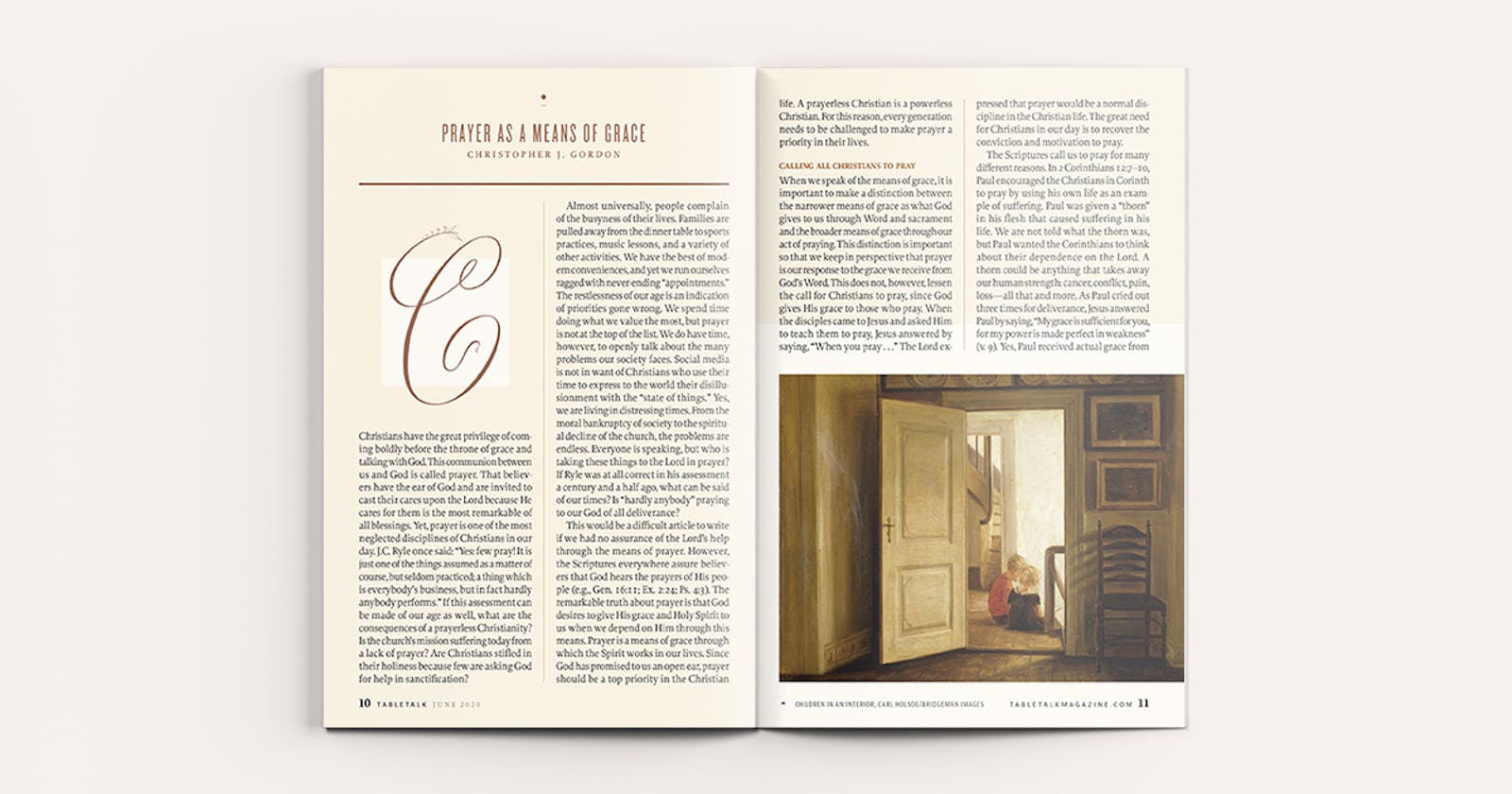
Request your free, three-month trial to Tabletalk magazine. You’ll receive the print issue monthly and gain immediate digital access to decades of archives. This trial is risk-free. No credit card required.
Try Tabletalk NowAlready receive Tabletalk magazine every month?
Verify your email address to gain unlimited access.
Christians have the great privilege of coming boldly before the throne of grace and talking with God. This communion between us and God is called prayer. That believers have the ear of God and are invited to cast their cares upon the Lord because He cares for them is the most remarkable of all blessings. Yet, prayer is one of the most neglected disciplines of Christians in our day. J.C. Ryle once said: “Yes: few pray! It is just one of the things assumed as a matter of course, but seldom practiced; a thing which is everybody’s business, but in fact hardly anybody performs.” If this assessment can be made of our age as well, what are the consequences of a prayerless Christianity? Is the church’s mission suffering today from a lack of prayer? Are Christians stifled in their holiness because few are asking God for help in sanctification?
Almost universally, people complain of the busyness of their lives. Families are pulled away from the dinner table to sports practices, music lessons, and a variety of other activities. We have the best of modern conveniences, and yet we run ourselves ragged with never-ending “appointments.” The restlessness of our age is an indication of priorities gone wrong. We spend time doing what we value the most, but prayer is not at the top of the list. We do have time, however, to openly talk about the many problems our society faces. Social media is not in want of Christians who use their time to express to the world their disillusionment with the “state of things.” Yes, we are living in distressing times. From the moral bankruptcy of society to the spiritual decline of the church, the problems are endless. Everyone is speaking, but who is taking these things to the Lord in prayer? If Ryle was at all correct in his assessment a century and a half ago, what can be said of our times? Is “hardly anybody” praying to our God of all deliverance?
This would be a difficult article to write if we had no assurance of the Lord’s help through the means of prayer. However, the Scriptures everywhere assure believers that God hears the prayers of His people (e.g., Gen. 16:11; Ex. 2:24; Ps. 4:3). The remarkable truth about prayer is that God desires to give His grace and Holy Spirit to us when we depend on Him through this means. Prayer is a means of grace through which the Spirit works in our lives. Since God has promised to us an open ear, prayer should be a top priority in the Christian life. A prayerless Christian is a powerless Christian. For this reason, every generation needs to be challenged to make prayer a priority in their lives.
Calling All Christians to Pray
When we speak of the means of grace, it is important to make a distinction between the narrower means of grace as what God gives to us through Word and sacrament and the broader means of grace through our act of praying. This distinction is important so that we keep in perspective that prayer is our response to the grace we receive from God’s Word. This does not, however, lessen the call for Christians to pray, since God gives His grace to those who pray. When the disciples came to Jesus and asked Him to teach them to pray, Jesus answered by saying, “When you pray . . .” The Lord expressed that prayer would be a normal discipline in the Christian life. The great need for Christians in our day is to recover the conviction and motivation to pray.
The Scriptures call us to pray for many different reasons. In 2 Corinthians 12:7–10, Paul encouraged the Christians in Corinth to pray by using his own life as an example of suffering. Paul was given a “thorn” in his flesh that caused suffering in his life. We are not told what the thorn was, but Paul wanted the Corinthians to think about their dependence on the Lord. A thorn could be anything that takes away our human strength: cancer, conflict, pain, loss—all that and more. As Paul cried out three times for deliverance, Jesus answered Paul by saying, “My grace is sufficient for you, for my power is made perfect in weakness” (v. 9). Yes, Paul received actual grace from the Lord through prayer. In his weakness, the grace of Christ rested on him, and he received strength.

Prayer is also a means to conform us to the image of Christ and to build His people up as His servants. The ongoing presence of sin in the believer’s life attacks this purpose. This is why prayer is so necessary for the Christian in sanctification. Surely there is some reader at this moment who is discouraged and deeply struggling with personal sin. This can be one of the most confusing experiences for the Christian. If Christ’s resurrection power rests on us, why are we so often defeated by ongoing sin in our lives? This is the struggle that Paul describes in Romans 7.
In Romans 8, however, Paul reminds us that Christians share the privilege as adopted children to cry, “Abba! Father!” As we do so, we are promised the help of the Holy Spirit who (1) puts to death sin in our lives (v. 13), (2) “bears witness with our spirits that we are sons of God” (v. 16), and (3) helps us with our weaknesses as He intercedes for us in prayer (vv. 26–27). These wonderful promises are concluded with an assurance of God’s predestinating purpose to conform us to the image of Christ (v. 29). These are remarkable helps that the heavenly Father gives to us through the work of the Holy Spirit as we depend on Him in prayer.
That the benefits of grace and the Holy Spirit are actually given to us through this means of prayer is the reason the Heidelberg Catechism, which divides its questions according to a fifty-two-Sunday schedule to guide pastors in preaching through the catechism in a year, devotes an entire Lord’s Day worth of reflection to encourage Christians to pray:
Why do Christians need to pray? Because prayer is the most important part of the thankfulness God requires of us. And also because God will give his grace and Holy Spirit only to those who continually and with heartfelt longing ask God for these gifts and thank him for them. (HC 116)
In our struggle with sin, God invites us to come to Him in prayer, and He answers by giving us His Spirit, who is actively sanctifying us. Prayer is the crucial avenue through which the Lord works this conformity so that we more and more begin to look like Jesus.
Recovering the Pastoral Prayer
While private prayer is a necessity in the Christian life for sanctification, there is another avenue of prayer that God has given to help Christians. Jesus specifically spoke of His Father’s house as a house of prayer. One of the greatest tragedies in American Christianity is the death of the pastoral prayer—prayer by the minister on behalf of the people during Lord’s Day worship. For hundreds of years, Protestant churches made corporate prayer an essential element of worship. Today, this prayer has been replaced with more time devoted to music. Little attention is given in corporate worship to prayer.
There is something spiritually beneficial for God’s people when they gather for corporate worship that is not acquired anywhere else. The Lord has promised to meet with His people in a special way. This is why prayer is an important element in corporate worship. Just as personal Bible reading does not replace receiving the means of grace in the preached Word of God, personal prayer does not replace the blessing of corporate Sunday prayer. When the minister prays, he is speaking on behalf of the people as an ambassador of Christ. With one voice, the people’s hearts are united together as their prayers ascend to the throne room of God.
I find the pastoral prayer to be a great blessing. If Ryle is correct that few pray in daily life, think of the help God gives to us when we gather together for prayer. In public worship, we quiet ourselves from the busyness of life and join our hearts in prayer as we are led by God’s appointed servant. The pastor leads us in proper praise, in confession of sin, in the advancement of God’s kingdom, in thanksgiving for God’s good gifts, and in the specific needs of the church. God is ready to hear the prayers of His people through His servant. Corporate prayer is one of the most edifying blessings of worship. If our churches are to have greater effectiveness in the gospel ministry, there will be a place of prominence given to the pastoral prayer.
Prayer is one of the greatest of privileges God has given to believers in Christ Jesus. Prayer is a means for you to enjoy your God as you were created to do. Maybe we don’t pray as we should because we have not learned to enjoy God in prayer as we should. Talk with your God; He desires for you to enjoy this communion. “Cast all your anxieties on him, because he cares for you” (1 Peter 5:7). The Lord listens to your prayers more certainly than you desire the thing you pray for (HC 129). What a gracious God who has offered Himself to you in the gospel of His Son. Whatever your praise, whatever your burden, take it to the Lord in prayer and wait on Him, for He is the Lord our God who accepts our prayer (Ps. 6:9).
